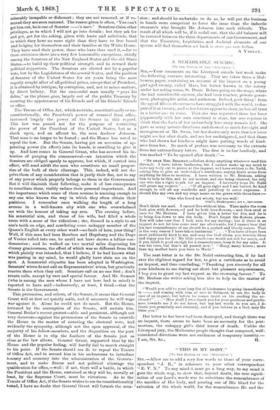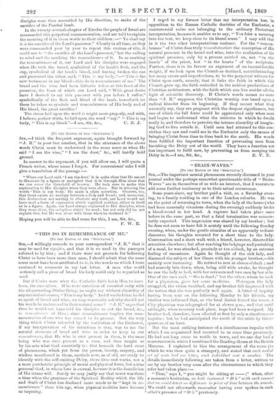"THIS IS MY BODY."
[To roe EDITOR Or rue "SPECTATOR •.]
Sin,—Allow me to add a very few words to those of your correspondent "J. IL," in reference to your other correspondent " K V. N." To any mind it must go a long way, to my mind it goes the whole way, to show that, beyond doubt, the true signification of our Lord's words was to substitute the remembrance of the sacrifice of His body, and pouring out of His blood for the salvation of the whole world, for the remembrance He and the disciples were then assembled by His direction, to make of the sacrifice of the Paschal lamb.
In the twenty-seventh chapter of Exodus the people of Israel are commanded this perpetual commemoration, and are told to explain the meaning of it in these words to their children :—" Ye shall say it is the sacrifice of the Lord's passover." Clearly in all time, as they were commanded year by year to repeat this custom or rite, it could not be " the sacrifice of the Lord's passover," but the calling to mind and the marking the remembrance of it. In so marking the remembrance of it, our Lord and his disciples were engaged when He took the bread, symbolical of the lamb's flesh, and the cup, symbolical of the lamb's blood, and having broken the one and presented the other, said, "This is my body,"—" This is the new testament in my blood—this do in remembrance of me." The bread and the wine had been hitherto taken at this feast of the passover, the feast of which our Lord said, " With great desire have I -desired to eat this passover with you before I suffer," symbolically of the flesh and blood of the lamb, henceforth let them be taken as symbols and remembrances of His body and of His blood, the great sacrifice !
The stress laid upon the word is might more properly, and with, I believe, perfect truth, be laid upon the word " my." " This is my body, " This is my blood."—I am, Sir, &c., C. B. J.



































 Previous page
Previous page